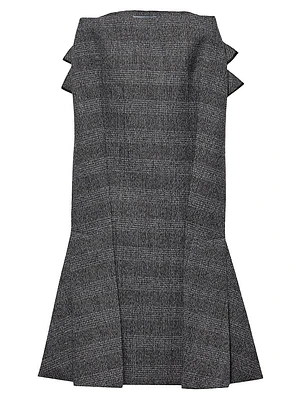Home
Peter Ablinger: Grisailles (1-100)
Barnes and Noble
Peter Ablinger: Grisailles (1-100)
Current price: $22.99


Barnes and Noble
Peter Ablinger: Grisailles (1-100)
Current price: $22.99
Size: OS
Loading Inventory...
*Product information may vary - to confirm product availability, pricing, shipping and return information please contact Barnes and Noble
Austrian composer
Peter Ablinger
has provided one of the most confounding and remarkable piano works of the late twentieth century in
Grisailles (1-100)
. Essentially a meditation on light and its relationship to time and creation,
Grisailles
is a series of 24 layers played by three pianos playing as well as repeated octaves, creating tonal and physical fissures in time -- fingers slipping over the keys, pedals being released, ambiguous sounds, and so on. Once the sequence is completed, it is used as a preliminary score whereby other layers are added until the sequence has been layered 100 times. The result is one of complete and total loss -- in the music, that is. Which is
Ablinger
's goal: to completely lose himself in the labyrinthine construction until he -- and thus the listener -- has no choice but surrender to what comes from the execution of the process. The structures are at times ornamental, and at times harmonic, rhythmical, and polytonal. The density is forbidding, but the way through is intuitive, clearing a path through unintentional spaces and fissures, which produce possibility. It's a provocative -- yet very listenable -- approach to the infinite. Light is the manner by which listeners make their way through this 50-minute work; it creates the relationship not just between the work and the listener, but also between the various elements held within the score itself. As always,
Hildegard Kleeb
gives a disciplined, determined reading -- she is simply one of the best around -- by cutting no corners, allowing for overtones to resonate fully, and then fills the cracks with whatever material she is offered next.
is a hearty work, and is physically and mentally demanding.
Kleeb
gives listeners its first recorded performance on three pianos with verve and passion. ~ Thom Jurek
Peter Ablinger
has provided one of the most confounding and remarkable piano works of the late twentieth century in
Grisailles (1-100)
. Essentially a meditation on light and its relationship to time and creation,
Grisailles
is a series of 24 layers played by three pianos playing as well as repeated octaves, creating tonal and physical fissures in time -- fingers slipping over the keys, pedals being released, ambiguous sounds, and so on. Once the sequence is completed, it is used as a preliminary score whereby other layers are added until the sequence has been layered 100 times. The result is one of complete and total loss -- in the music, that is. Which is
Ablinger
's goal: to completely lose himself in the labyrinthine construction until he -- and thus the listener -- has no choice but surrender to what comes from the execution of the process. The structures are at times ornamental, and at times harmonic, rhythmical, and polytonal. The density is forbidding, but the way through is intuitive, clearing a path through unintentional spaces and fissures, which produce possibility. It's a provocative -- yet very listenable -- approach to the infinite. Light is the manner by which listeners make their way through this 50-minute work; it creates the relationship not just between the work and the listener, but also between the various elements held within the score itself. As always,
Hildegard Kleeb
gives a disciplined, determined reading -- she is simply one of the best around -- by cutting no corners, allowing for overtones to resonate fully, and then fills the cracks with whatever material she is offered next.
is a hearty work, and is physically and mentally demanding.
Kleeb
gives listeners its first recorded performance on three pianos with verve and passion. ~ Thom Jurek


















